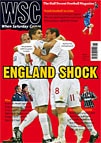 A new and impressive stadium is available for Euro 2012 but, as Jonathan Wilson explains, it may not actually see any football
A new and impressive stadium is available for Euro 2012 but, as Jonathan Wilson explains, it may not actually see any football
Coming in from the airport, you drive over the brow of a hill and there before you, the Donbass Arena appears, a pulsing blue diamond embedded amid the slag heaps of industrial Donetsk. It is a magnificent site and it is, in truth, a magnificent stadium, but you do wonder whether it has become a metaphor for itself, a lone and perhaps superfluous point of light in a city struggling desperately with recession.
As the official story goes, Rinat Akhmetov went to watch France play Ukraine in the Stade de France in 1999 and had a dream. He wanted a stadium for himself, in his home town, for Shakhtar, the club he had acquired following the bomb attack that killed the previous president three years earlier. Ten years later, at a cost of $400 million (£250m), all paid by Akhmetov, that dream was realised in last month’s grand opening ceremony.
It was a classic eastern European blend of mind-blowing choreography and mind-numbing oratory, followed by a concert from Beyoncé. “This is a great place they’ve got here,” she said, and few would disagree. The 50,000-capacity arena would be a fine stage for the Euro 2012 semi-final which it is scheduled to host. The problem is that it may not, not because of any intrinsic flaw, but because Donetsk itself lacks the infrastructure to host such a major event.
The city itself has a dreadful reputation as some decrepit industrial dynamo, which isn’t entirely fair. Yes, the landscape is dotted with slag heaps, but Donetsk was once known as the city of roses and it is blessed with a number of municipal parks. Akhmetov has even built a park around his stadium, featuring 70,000 plants, half of them rosebushes. It is – so far as you can tell by wandering around, popping into bars – friendly and vibrant, but industrial production fell by 50 per cent last year and steel prices have dropped to around a quarter of what they were. Unemployment is estimated at over 20 per cent, while around a third of those who remain in work are thought to be operating for a fraction of their previous salaries.
More pressingly for 2012, at the beginning of the year there were only 583 hotel rooms in the city. Which, even without teams and their officials, UEFA delegates and journalists, is clearly an impossible situation. Michael Platini spoke glowingly in September of the rapid progress Ukraine has made, saying it has moved from red on UEFA’s colour-coded scheme of risk form to orange (which is still some way from green, but is a positive sign before a final decision is made on hosting rights for 2012 in November). “The hotels appeared from nowhere,” he said. “I don’t understand where the Ukrainians have got them from.”
And yet the 18 foreign journalists who covered the opening of the stadium were bussed to the airport at 2.30am to be flown an hour west to hotels in Kiev. When mayor Gennadiy Blizhnyuk spoke of flying fans to other cities in the Donbass region after games, most dismissed his comments as the ramblings of an eccentric old man; suddenly the spectre was raised that that might actually be part of the plan.
Even the airport needs redevelopment. At the moment it features one departure gate and seems overwhelmed if two planes have to arrive or depart within half an hour of each other. “The stadium is terrific,” said Martin Kallen, the Swiss director of UEFA’s 2012 committee. “But there is a lot of work to be done to make UEFA confident. We have guarantees from the government about funding for the airport, but we need to see work begin and for the hotels there is a lot to do. It’s not looking as good as we had hoped.” Whispers within UEFA are notoriously difficult to read, but there seems a serious possibility that Ukraine could be left with just two venues – probably Kiev and the western city of Lviv, which is a UNESCO heritage site and has a developed tourist infrastructure.
The mood in Donetsk is mixed. Most seem proud of Shakhtar’s success, their new stadium, and recognise the economic benefits it and Euro 2012 may bring (although you do wonder what Donetsk would do with a rash of new hotels). There are also those, however, who look at the stadium and wonder whether $400m might not have been better spent in subsidising the mines and the steelworks through the bad times.
From WSC 273 November 2009
Donbass Arena as a host stadium for Euro 2012 five matches has launced the programme to encourage international fans to visit Donetsk: http://euro2012.donbass-arena.com/